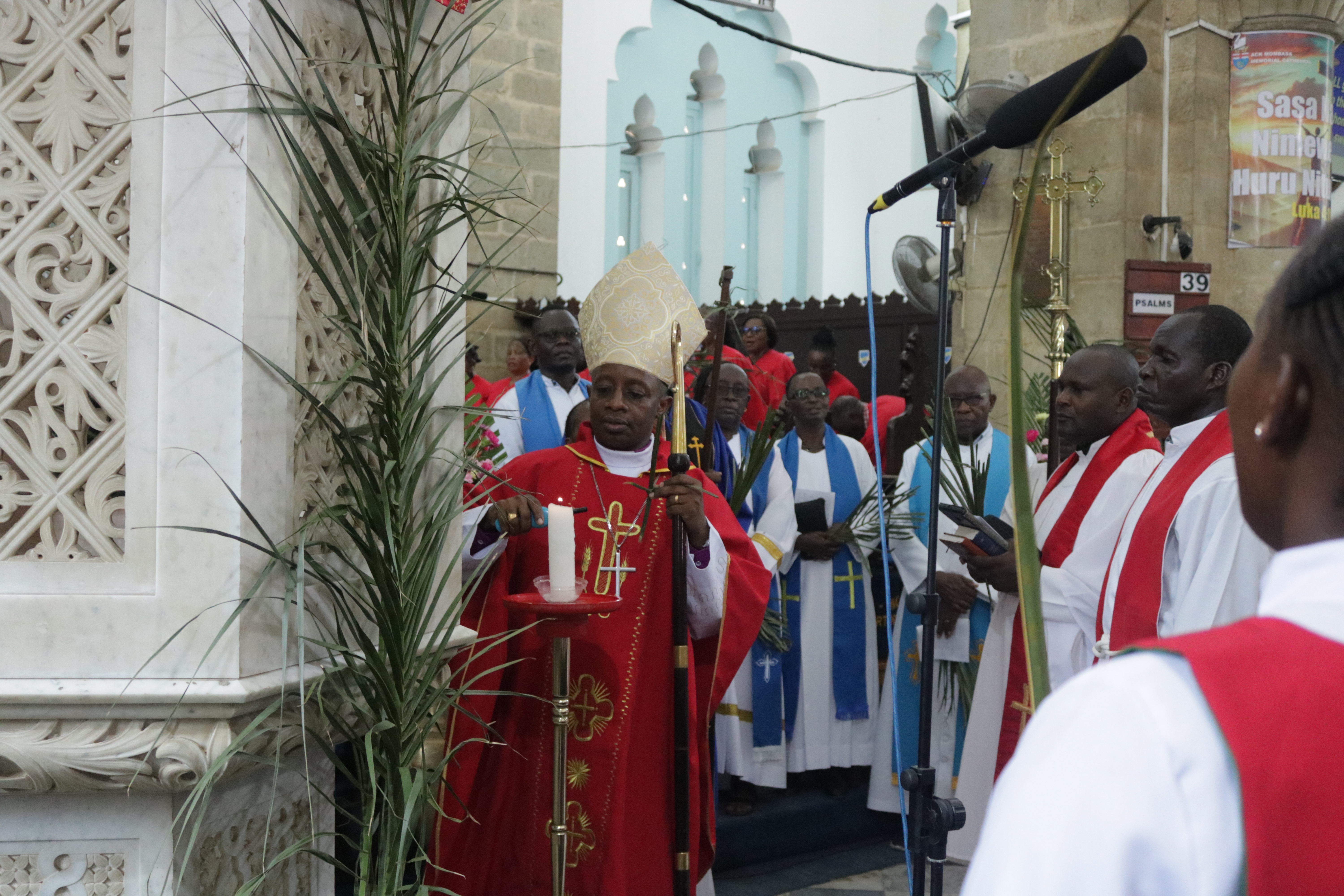 <
<It marks the beginning of the holy week, a time to reflect on Christ's love, sacrifice And humility.

The Bishop Of Mombasa, Rt. Rev. Dr. Alphonce Mwaro Baya, Led the faithful of Mombasa Diocese in remembrance of Jesus' triumphant entry into Jerusalem, greeted with palm branches and praises of "Hosanna" from MMC through the treasury square in style. It marks the beginning of the holy week, a time to reflect on Christ's love, sacrifice And humility.
One day I listened to a heated exchange of disagreements that generated into abuses and fighting between two friends. Each was accusing the other of the problem they were in. None was willing to own the problem. Each pleaded innocence. Once the anger had subsided, I possed a question to them: what do you see about yourself in this conflict? They were silent, then one of them said, " I didn't know I could spark insults and fight." He was profusely remorseful.
He realised the other side of him. Perhaps, it lay latent waiting to be provocked to manifest. He saw himself in the conflict. He saw his character. He saw his contribution.
It is possible to read and narrate the passion of our Lord Jesus Christ and see the characters who killed him. It is possible to see the horror, terror, accusations and betrayal that our Lord went through. It is possible not to see ourselves in the Lord's passion. For this reason, we invite you/us to see ourselves in the passion of our Lord Jesus Christ.
From the scene of cruxification on the cross, two thieves (Luke calls them criminals,32-33) were crucified with Jesus Christ. One of the thieves joined the crowds in mocking Jesus Christ (39). His name was Gestas.You can imagine in that suffering, pain and impending death, Gestas mocked, insulted Jesus Christ, demanding that Jesus do something about their precarious situation (39). He questioned his identity: "Are you the Messiah? "Save yourself and us."
While this was a mock, we cannot rule out that Gestas could have desired to be saved from the cross. He applead to the testimony of his power and miracles. His power to save, heal and overthrow earthly kingdom as a Messiah. His proposal was powerfully inticing, -do not only save us, but also yourself. He was telling Jesus- in this one you have a share, a fat cut, you will also benefit. He perpetuated his moral corruption at the cross. Sadly, Gestas acknowledged his physical helplessness, but ignored his deep moral corruption, helplessness. The root cause of his corruption. The inclusion of Jesus in the mocking proposal was tempting, a mirror of the temptations the Lord went through in the desert.
On the contrary, the Lord Jesus did not even comment about the mocking inticing proposal. Rather, as it were from the beginning, he demonstrated consistence in rejecting inticing persuasions to use power and authority for his gratification and glorification apart from the cross.
On the contrary, the Lord Jesus did not even comment about the mocking inticing proposal. Rather, as it were from the beginning, he demonstrated consistence in rejecting inticing persuasions to use power and authority for his gratification and glorification apart from the cross.
From Gestas's mock, we get to know that the most dangerous thing is to use knowledge, experience and testimony about the Lord Jesus to sin against Him. This sinful attitude hardens the one who practices it. It builds walls around his/her heart so that he/she cannot see out,, and others cannot see in. The more one partake sin, the more closed his hearts become. In addition, we may desire physical deliverance or from any form physical helplessness, sadly reject salvation from sin, the root cause of all decaying.
On the contrary, Dismus (Greek word for dying), the other thief, admonished him, stepped in and defended Jesus. He reminded his collegue that they had done wrong. They deserved their condemnation. He posed a question to him, "don't you fear God.?" ( 40-41). Dismus was truthfully firm in pointing out to Gestas that Jesus was innocent. He didn't deserve to be a receipient of such humiliation, abuses and redicule, much less subjected to a cruxification. He became an apologist, a defender of Jesus Christ. Interestingly, while the Judicial, political, and religious institutions had unjustly condemned Jesus, and now Gestas, too, the dying Dismus a condemned thief, defended Jesus Christ. He decleared him innocent. He turned to Jesus Christ, and made a petition- Remember me when you come to your kingdom.
1. We make a petition: Jesus Remember me(42-43) Dismus acknowledged both his physical helplessness, moral corruption and the deserved condemnation- He asserted, "we are punished justly, for we are getting what our deeds deserve." His soul was headed to everlasting darkness until he cried to Jesus. He was craving for inclusion in Jesus's kingdom. In the passion of our Lord, Dismus saw his sins, he pleaded guilty to his criminal offence, in his last hour he saw the window of grace in the passion of our Lord. He did the right thing- petitioned for inclusion in the Lord's Kingdom.
Whereas Dismus, petitioned to be included in the future Kingdom, - "remember me when you come into your kingdom-" Jesus included him, in the now kingdom. He was immediately received in Jesus's paradise- to share in His kingdom. The way of the cross leads us to paradise with Him. Jesus has power to bring the future kingdom to now kingdom. Jesus has power to bring the merits of the future kingdom to now.
The excurating pain that Dismus went through was potent enough to distract him from dialogue with Christ, from making that petition, perhaps he was not in a conviet place, time, and circumstances for such a blod declaration. The lesson here is that Jesus Christ listens to anyone at any time, place and circumstances. He listens, responds and rewards petitions. It is not the circumstance of the moment that matter, but seeing oneself in the passion of our Lord Jesus, and petition him accordingly.
On the whole, when we see ourselves in the passion, we see our sinfulness and its deserved consequences, and wisely rightfully confess, repent and petition the Lord for forgiveness and inclusion in his Kingdom. On the contrary, if one failed to see himself in the passion of our Lord, he becomes contemptuous of the Lord's person, works and grace. Sadly miss the opportunity to enter into the Lord's kingdom, ultimately die in sin.
2. Affirm Jesus's innocence(40-41) Dismus, the dying thief, unequivocally declared the innocence of our Lord Jesus Christ. He found no fault in the life of Jesus Christ. The innocence of our Lord is also captured in Isaiah 50:5-6:
The Sovereign Lord has opened my ears, I have not been rebellious, I have not turned away. I offered my back to those who beat me, my cheeks to those who pulled out my beard, I did not hide my face from mocking and spitting.
In addition, Philippians 2:8: is graphical description our Lord's passion as acts of humility and obedience unto death on the cross captures innocence of our Lord. That "He humled himself in obedience to God and died a criminal's death- even death on a cross."
The portraits of the Lord's innonce is a stark contrast to the life of the sinful nature of the thieves/ criminals on the cross. When one discovers the innonce of the Lord in his passion, he/she discovers his/ her sinful dispoition and the need for salvation.
The innocence of the Lord qualified him to become the perfect sacrifice to vicariously die on the cross, resurrect to conquer sin, death and in public triumphantly disarmed satan. Consequently, the restoration of innonce to those who believe. While the Roman and Jewish law had found Dismus, guilty, upon his conversion, the Lord Jesus restored his innocence. By accepting him in His Kingdom, Jesus declared him innocent and free from all guilty and condemnation.
In the Garden of Eden, satan came to still our innonce, on the cross, the Lord Jesus restored it. A meditative reflection of the beginning of creation, we discover the blessedness of paradise was innocence. It was after the fall that Adam and Eve lost innocence and ran way, hide and cover up to conceal themselves. The dying Dismus, became innocent in Christ Jesus. He was once again restored to the innonce of Paradise. He shared in the innocence of Jesus Christ, hence a share of His Kingdom.
You may be here this morning, your sins weigh heavily in your heart, you are condemned by everyone, don't harden your heart, turn to Christ- he will declare you innocent and grant you perfect freedom, and a share of his kingdom.
Two things are likely to happen when we see ourselves in the passion of our Lord
1. A petition for rememberance and inclusion in the Lord's kingdom.
2. Acknowledging the innocence of our Lord Jesus Christ, one is gifted with Christ's innocence and perfect freedom from guilty and condemnation.

The Kenya Anglican men’s Association traces its roots from the Mother’s Union operations. Retired Archbishop Manasses Kuria was so impressed by the work of the Mothers’ Union that he felt it right to start what was formerly referred to as the Fathers’ Union. The union first started in the same parish where the first pioneer Mothers’ Union members had been enrolled, namely Mwongoiya in Anglican Diocese of Mount Kenya South. It has over the years grown and spread to all the ACK Dioceses across the Country, becoming part and parcel of the Church ministry....

The Kenya Anglican men’s Association traces its roots from the Mother’s Union operations. Retired Archbishop Manasses Kuria was so impressed by the work of the Mothers’ Union that he felt it right to start what was formerly referred to as the Fathers’ Union. The union first started in the same parish where the first pioneer Mothers’ Union members had been enrolled, namely Mwongoiya in Anglican Diocese of Mount Kenya South. It has over the years grown and spread to all the ACK Dioceses across the Country, becoming part and parcel of the Church ministry....

Sharing the word of God with children. Mark 16:15 "And He said to them, “Go into all the world and preach the gospel to all creation."
Organizing services, fellowship and forums for children to grow spiritually, physically emotionally mentally and socially. Proverbs 22:6 "Train up a child in the way he should go; even when he is old he will not depart from it.”